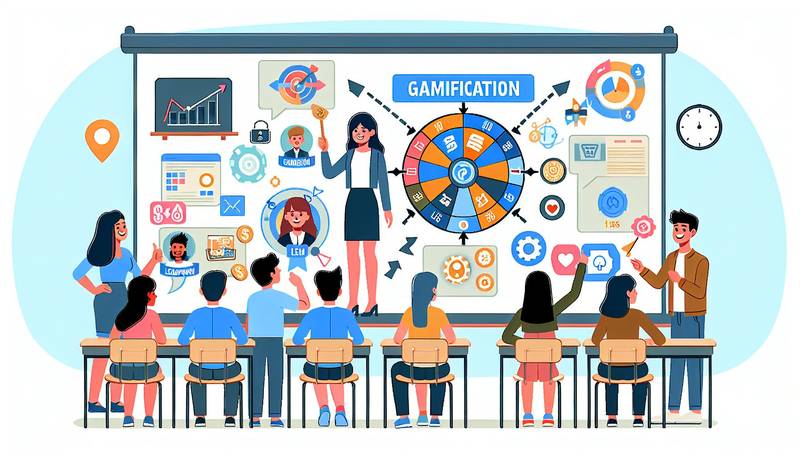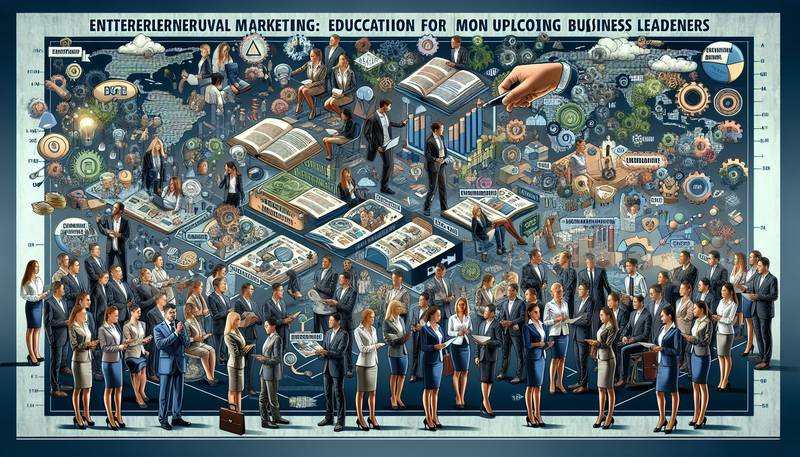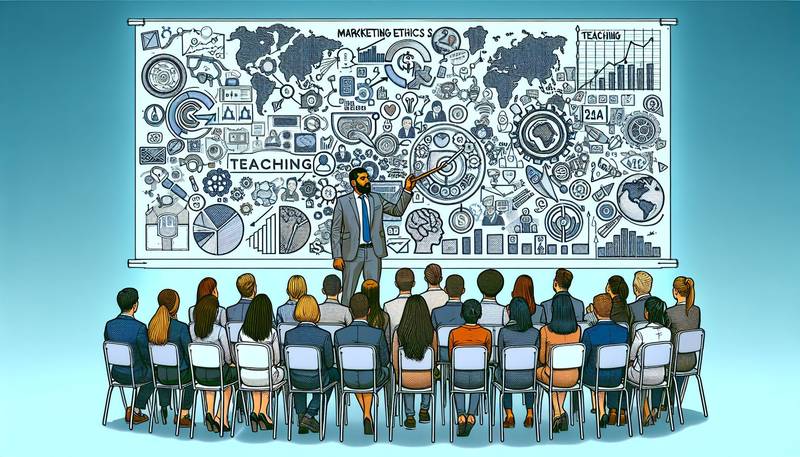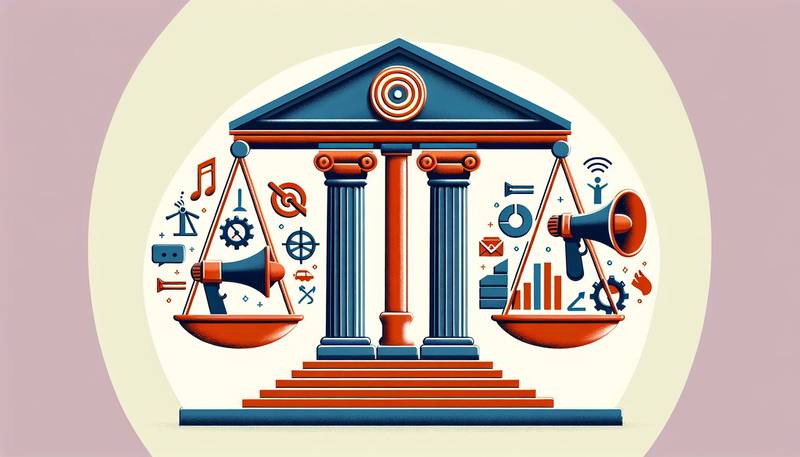The Role of Storytelling in Effective Marketing Education
In the realm of marketing education, storytelling has emerged as a powerful tool for conveying information and engaging audiences. By weaving narratives into educational content, marketers can capture the attention of learners, make complex concepts more relatable, and foster a deeper understanding of key principles.
- 12/26/2023
- 4 min read
 Click
to read the article
Click
to read the article
In this article, we will explore the role of storytelling in effective marketing education, delving into its benefits, strategies, and best practices.
The Power of Storytelling in Marketing Education
Storytelling has long been recognized as a potent communication tool, with the ability to evoke emotions, create connections, and spark engagement. In the context of marketing education, storytelling serves as a vehicle for delivering information in a compelling and memorable way. By framing concepts within a narrative structure, educators can make lessons more relatable and impactful for learners.
One of the key advantages of using storytelling in marketing education is its ability to humanize complex ideas. Rather than presenting dry facts and figures, stories provide context and relevance, allowing learners to see how concepts apply to real-life situations. This can make the material more accessible and engaging, helping students to retain information and apply it in practical settings.
Engaging Audiences through Narrative
In addition to making content more relatable, storytelling can also help marketers to engage audiences on a deeper level. By incorporating elements of suspense, conflict, and resolution into their narratives, educators can capture the attention of learners and keep them invested in the material. This can lead to higher levels of participation, retention, and overall satisfaction with the learning experience.
Furthermore, storytelling has the unique ability to tap into the emotional side of learning. By crafting narratives that elicit feelings of empathy, curiosity, or excitement, educators can create a more immersive and impactful educational experience. This emotional connection can lead to stronger engagement, deeper comprehension, and a lasting impression on learners.
Strategies for Effective Storytelling in Marketing Education
To effectively leverage storytelling in marketing education, educators should consider a few key strategies. First and foremost, it is crucial to tailor the storytelling approach to the audience and subject matter. By understanding the preferences and learning styles of their students, educators can create narratives that resonate with them and enhance the learning experience.
Additionally, educators should strive to keep their stories relevant, concise, and engaging. By focusing on key themes, characters, and plot points, they can ensure that the narrative remains clear and impactful. It is also important to incorporate visual elements, such as images, videos, or infographics, to enhance the storytelling experience and appeal to different types of learners.
Best Practices for Incorporating Storytelling into Marketing Education
When incorporating storytelling into marketing education, there are several best practices that educators should keep in mind. First and foremost, it is important to maintain a balance between storytelling and educational content. While stories can be powerful tools for conveying information, they should not overshadow the main learning objectives of the course.
Furthermore, educators should strive to make their stories authentic, relatable, and compelling. By drawing on personal experiences, case studies, or industry examples, they can create narratives that resonate with learners and drive home key concepts. It is also important to invite students to participate in the storytelling process, whether through group discussions, assignments, or interactive exercises.
Conclusion
In conclusion, storytelling plays a crucial role in effective marketing education, helping educators to convey information, engage audiences, and foster deeper learning. By weaving narratives into educational content, marketers can make lessons more relatable, memorable, and impactful. By incorporating storytelling strategies and best practices, educators can create a more immersive and engaging learning experience for their students. As the landscape of marketing education continues to evolve, storytelling will remain a powerful tool for connecting with learners and driving meaningful change.
Recent posts
Random news

The Growth of E-commerce and its Impact on Marketing Education
- 2023-12-25T00:00:00Z

The Relevance of Guerrilla Marketing in Educational Curricula
- 2024-01-01T00:00:00Z

Teaching Customer-Centric Marketing Strategies
- 2023-12-30T00:00:00Z

Utilizing Case Studies in Marketing Education for Real-World Learning
- 2024-01-15T00:00:00Z

Sustainability and Ethics in Modern Marketing Education
- 2024-02-27T00:00:00Z

Leveraging Big Data in Marketing Education
- 2023-12-31T00:00:00Z

Personal Branding and its Importance in Marketing Education
- 2024-02-10T00:00:00Z

Adapting to Change: Agile Methodologies in Marketing Education
- 2024-02-14T00:00:00Z

The Intersection of Psychology and Marketing in Educational Programs
- 2024-01-14T00:00:00Z

Content Marketing: Crafting a Core Component of Marketing Education
- 2023-12-18T00:00:00Z

The Importance of Cultural Competency in Global Marketing Education
- 2024-01-15T00:00:00Z

Building a Successful Career in Marketing through Education
- 2024-01-04T00:00:00Z

The Power of Visual Storytelling in Marketing Education
- 2024-02-05T00:00:00Z

Influencer Marketing: Teaching the New Age of Endorsement
- 2024-02-09T00:00:00Z

Building Collaborative Skills in Marketing Students through Team-Based Projects
- 2024-02-10T00:00:00Z

Email Marketing: An Indispensable Skill in Marketing Education
- 2024-01-27T00:00:00Z

Blending Traditional and Digital Marketing in Education Programs
- 2024-02-20T00:00:00Z

Engaging Millennials and Gen Z in Marketing Education
- 2024-01-10T00:00:00Z

Branding Basics: An Essential Course in Marketing Education
- 2024-02-27T00:00:00Z

Mobile Marketing: Education for the Smartphone Era
- 2024-01-13T00:00:00Z

The Synergy between Marketing and Sales: An Educational Perspective
- 2024-02-26T00:00:00Z


Cross-Cultural Marketing Education: Preparing for Global Challenges
- 2024-03-02T00:00:00Z

Staying Ahead: Continuous Learning in Marketing
- 2023-12-04T00:00:00Z

From Concept to Market: The Product Development Process
- 2024-02-25T00:00:00Z

Personal Selling and Sales Management in Marketing Education
- 2023-12-30T00:00:00Z

How to Design an Effective Marketing Education Curriculum
- 2024-03-01T00:00:00Z

Teaching the Future: Predictive Analytics in Marketing Education
- 2023-12-03T00:00:00Z

Developing Leadership Skills through Marketing Education
- 2024-02-13T00:00:00Z

Marketing Automation: Teaching the Tools of Efficiency
- 2023-12-18T00:00:00Z

Crisis Management and Communication in Marketing Education
- 2024-01-14T00:00:00Z

How to Effectively Use Gamification in Marketing Education
- 2024-03-01T00:00:00Z

Understanding the Marketing Mix in Today's Digital World
- 2024-01-20T00:00:00Z

Understanding Consumer Behavior: A Foundation of Marketing Education
- 2024-01-07T00:00:00Z

Emerging Trends in Marketing Education for the 21st Century
- 2024-02-06T00:00:00Z

Mastering the Fundamentals of Marketing Education
- 2023-12-17T00:00:00Z

Integrating Customer Feedback into Marketing Educational Programs
- 2023-12-21T00:00:00Z

The Future of Marketing Education: Predictions and Preparations
- 2024-03-11T00:00:00Z

Integrating Digital Tools into Marketing Education
- 2024-02-22T00:00:00Z

Strategic Marketing Planning: A Key Focus in Marketing Education
- 2024-02-23T00:00:00Z

From Classroom to Career: Marketing Education Pathways
- 2024-03-04T00:00:00Z

The Advantages of Online Marketing Education
- 2024-02-23T00:00:00Z

The Impact of AI and Automation on Marketing Education
- 2023-12-11T00:00:00Z

Utilizing Virtual Reality in Marketing Education
- 2024-01-01T00:00:00Z

Collaborative Learning in Marketing Education: Benefits and Strategies
- 2023-12-30T00:00:00Z

The Significance of Customer Relationship Management in Marketing Education
- 2024-01-29T00:00:00Z

Public Relations and Its Role in a Marketing Education
- 2023-12-11T00:00:00Z

Search Engine Optimization: A Must-Have Skill in Marketing Education
- 2024-02-15T00:00:00Z

Innovation in Retail Marketing: Trends and Education
- 2024-03-07T00:00:00Z

Personal Branding 101: Teaching the Fundamentals in a Digital Age
- 2023-12-03T00:00:00Z

The Role of Experiential Learning in Shaping Tomorrow's Marketing Leaders
- 2024-02-16T00:00:00Z

Entrepreneurial Marketing: Education for Upcoming Business Leaders
- 2024-01-06T00:00:00Z

Building and Managing Strong Brands: A Marketing Education Focus
- 2024-02-05T00:00:00Z

The Benefits of Experiential Learning in Marketing Education
- 2024-01-05T00:00:00Z

Developing Effective Marketing Communications Strategies
- 2024-01-30T00:00:00Z

Creating Compelling Content: A Pillar of Marketing Education
- 2024-02-04T00:00:00Z

Viral Marketing: Strategies and Education
- 2024-01-22T00:00:00Z

Teaching the Importance of Market Research in Decision Making
- 2024-03-07T00:00:00Z

Teaching the Art and Science of Pricing Strategies in Marketing
- 2024-01-10T00:00:00Z

Challenges and Solutions in Teaching Marketing Ethics
- 2023-12-04T00:00:00Z

The Importance of User Experience (UX) in Marketing
- 2023-12-10T00:00:00Z

Direct Marketing Techniques in the Educational Curriculum
- 2023-12-21T00:00:00Z

The Evolution of Marketing Education in the Digital Era
- 2023-12-14T00:00:00Z

The Role of Social Media in Modern Marketing Education
- 2024-03-10T00:00:00Z

Digital Advertising: A Core Subject in Marketing Education Today
- 2024-02-02T00:00:00Z

Teaching the Legal Aspects of Marketing
- 2023-12-04T00:00:00Z

Web Analytics and Digital Insights for Marketing Professionals
- 2024-01-05T00:00:00Z

The Role of Storytelling in Effective Marketing Education
- 2023-12-26T00:00:00Z

Sustainability and Ethics in Marketing: Incorporating Modern Values into Education
- 2024-02-23T00:00:00Z

Leveraging Social Media in Marketing Education: Opportunities and Challenges
- 2024-01-08T00:00:00Z

Nurturing Creativity and Innovation in Marketing Students
- 2024-02-13T00:00:00Z

Bridging the Gap between Theory and Practice in Marketing Education
- 2024-01-05T00:00:00Z

The Role of Internships in Enhancing Marketing Education
- 2023-12-25T00:00:00Z

The Importance of Analytics in Marketing Education
- 2024-02-25T00:00:00Z

The Role of Design Thinking in Marketing Education
- 2023-12-06T00:00:00Z

The Importance of Creativity in Marketing Education
- 2024-01-16T00:00:00Z

Event Marketing: Education for Memorable Brand Experiences
- 2024-01-21T00:00:00Z

Evaluating Marketing Education: Metrics for Success
- 2023-12-18T00:00:00Z

Global Marketing Strategies: Education for a Borderless World
- 2024-02-07T00:00:00Z

Navigating the World of Affiliate Marketing in Educational Programs
- 2024-01-15T00:00:00Z

The Importance of Networking in Marketing Education
- 2024-01-30T00:00:00Z

B2B Marketing: Developing Skills for the Business Market
- 2023-12-25T00:00:00Z

How Technology is Reshaping Marketing Education
- 2024-01-27T00:00:00Z

The Evolution of Marketing Education: Preparing Students for a Data-Driven World
- 2023-12-21T00:00:00Z

Effective Use of Social Listening Tools in Marketing
- 2024-02-18T00:00:00Z

From Classroom to Boardroom: Real-World Applications of Marketing Theories
- 2024-02-04T00:00:00Z

Exploring the Intersection of Psychology and Marketing in Educational Programs
- 2024-02-16T00:00:00Z

Marketing for Social Impact: Education for Change
- 2023-12-10T00:00:00Z

Lifestyle Marketing: Connecting Brands with Consumers' Lives
- 2024-01-05T00:00:00Z

Developing a Global Mindset through Marketing Education
- 2024-02-23T00:00:00Z

Enhancing Digital Literacy in Marketing Education
- 2024-02-07T00:00:00Z

Adapting Marketing Strategies for the Non-Profit Sector
- 2024-03-04T00:00:00Z

Marketing to Millennials: Challenges and Strategies
- 2024-02-20T00:00:00Z

The Role of Data Privacy in Marketing Education
- 2023-12-19T00:00:00Z

The Art of Convincing: Persuasion Techniques in Marketing
- 2024-02-06T00:00:00Z

Preparing Marketers for the Challenges of Globalization
- 2024-01-25T00:00:00Z

Bridging the Gap: Integrating Digital Tools into Traditional Marketing Curriculum
- 2024-02-04T00:00:00Z

Crowdfunding as a Marketing Tool: An Educational Perspective
- 2023-12-11T00:00:00Z

Navigating the Future of Marketing Education: Trends and Innovations
- 2023-12-08T00:00:00Z

Cultivating Strategic Thinking in Marketers through Education
- 2023-12-06T00:00:00Z
 Marketing Minds: Unleashing Your Potential in the Modern Age
Marketing Minds: Unleashing Your Potential in the Modern Age